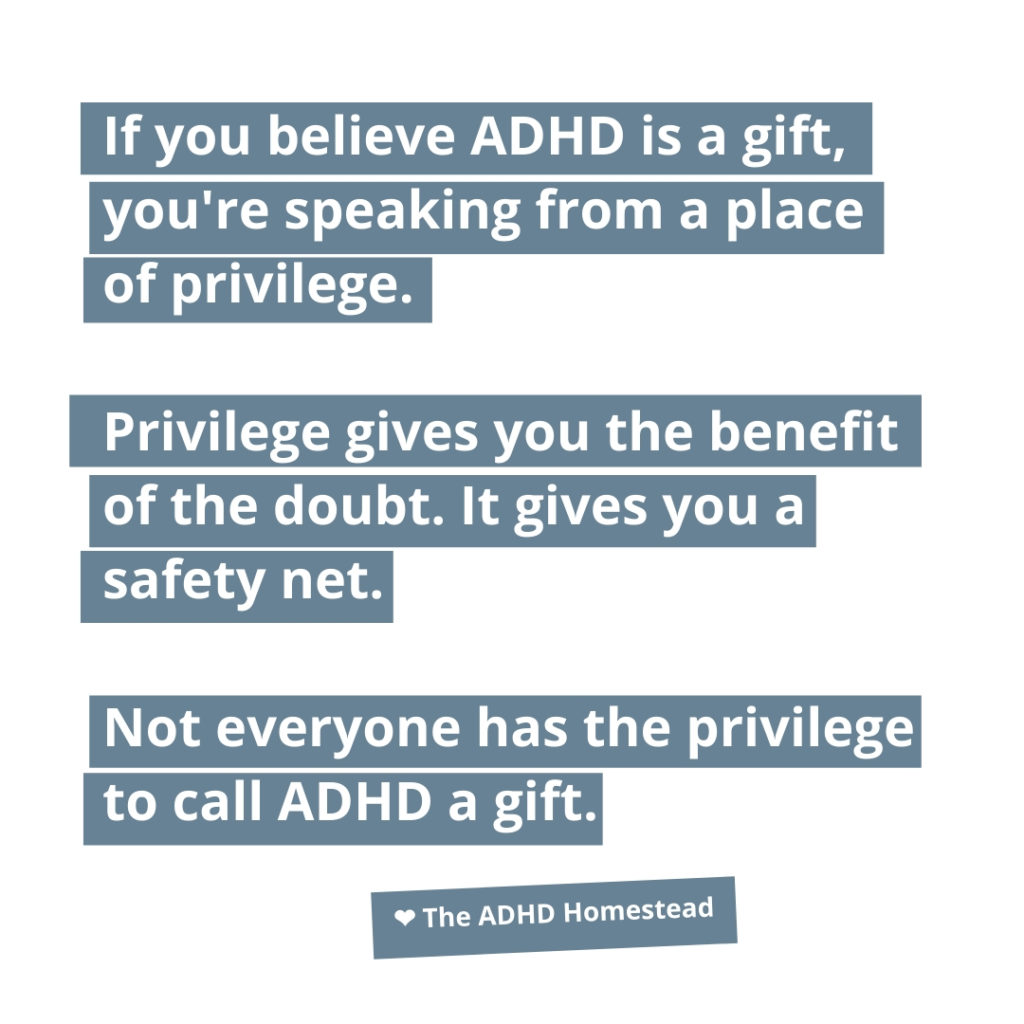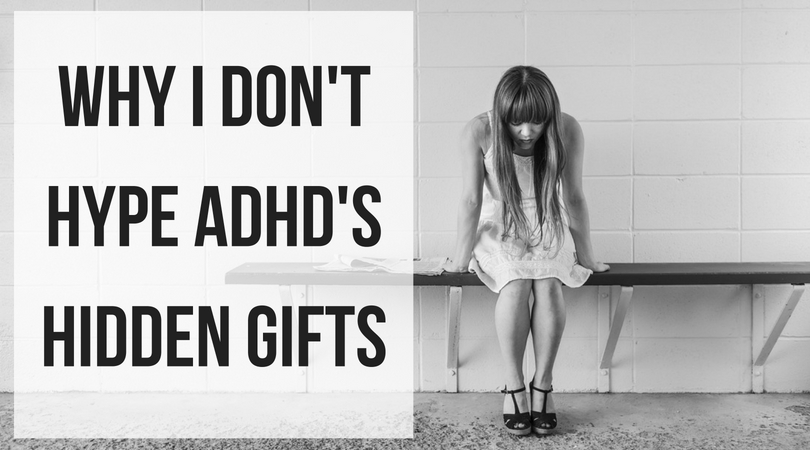Every once in a while, someone criticizes me for focusing too much on ADHD’s impairments. After all, some of the world’s most successful people have ADHD! Clearly it’s all about attitude, right? People like me, who pathologize neurodiversity, are part of the problem.
Except it’s not all about attitude. If you believe ADHD makes you special, or that people with ADHD can use it to become successful, you’re speaking from a place of privilege.
When I say privilege, I mean a class, family, cultural, or racial background that gives you room to make mistakes. Privilege doesn’t always hand you success for free. I know a lot of hard-working people who benefit from privilege. But having privilege means you get the benefit of the doubt. It means people expect you to do something with your life. You have a safety net when you screw up. In other words, privilege makes hard work more likely to pay off.
Many, many people with ADHD have less privilege than I do. I feel accountable to them when I talk about the ways ADHD can affect our lives — and what we can do about it. Not everyone has the options, the support, or the wiggle room to call ADHD a gift.

ADHD & creativity: your mileage may vary
People who celebrate ADHD’s gifts often point to famous entrepreneurs, rock stars, and artists as examples. I admit, Einstein’s academic struggles do make for a great Pass It On billboard. It’s easy to assume the world needs people with ADHD.
And some people with ADHD are highly intelligent, innovative, or creative. Some use their hyperfocus to get in the zone and produce great work.
But there’s no guarantee. Anyone can have ADHD. The disorder itself doesn’t supply us with bonus creativity or intelligence.
I want to be clear about this because some creative people feel anxiety about treating ADHD. I’ve heard from a few that ADHD medication made them “less creative.” That sounds more like the wrong treatment than evidence against any treatment at all.
Since I began treating my ADHD (with a variety of strategies, not just meds) I’ve finished two books. I’ve worked on this blog for four years. Before diagnosis and treatment, I finished zero books and presided over a massive graveyard of abandoned blog projects. Letting ADHD run free does not always mean letting your creativity run free. Sometimes it means just the opposite.
Protest is privilege
Claiming ADHD as a gift often means protesting treatment, or even the ADHD label itself. At the very least, it means celebrating traits that don’t conform to society’s expectations.
The problem with non-conformity is it’s not available to everyone. To see and appreciate the benefits of your ADHD, you first need the freedom to blaze your own path outside labels and treatment.
To protest the ADHD label, you must benefit sufficiently from ADHD and outside support. You must live the kind of life that’s not about to be ruined by lack of focus, poor impulse control, and intolerance for tedium. Not everyone has access to that life.
Privilege is freedom to make mistakes
Privilege shields us from the most devastating consequences of our actions. It gives us more latitude to make mistakes. It gives us the benefit of the doubt when we fail to do our best.
People with ADHD make a lot of mistakes. Behind any successful person singing their ADHD’s praises, I’d be willing to bet there’s a pillar of support. It might be parents with resources to offer a bailout when an ADHDer loses a job. Maybe’s it’s a paid assistant at the office, or a nanny, or a spouse who shoulders practical responsibilities. Even an education, skillset, or strong interest in a lucrative field can give us an advantage.
This is not to say successful ADHD-embracers don’t work hard. But if you reap any benefits from ADHD, you should honor the people and circumstances that insulate you from the downsides.

Support and expectations can reduce ADHD fallout
I recently listened to someone spend several minutes praising her children’s school, which “doesn’t believe in medication and all that.” She told me a familiar story about how lots of kids with ADHD go on to be successful entrepreneurs.
Here’s the part she glossed over: tuition and private tutoring cost her tens of thousands of dollars per year — per kid.
Kids born into wealthy families have more tools to mitigate ADHD’s negative effects. Even if they go to public schools and don’t receive private tutoring, expectations are high. Going to college is a given. Having a job as a teenager may be encouraged, but not necessary if it’s going to cut into study time.
For young people without these resources — whose family and community may already view higher education as frivolous and uppity — academic success is neither expected nor guaranteed. These students hear a constant stream of “You won’t become anything” or “Why would you want to spend all that money on college when you could be working to support your family?” It can be nearly impossible to find the strength to keep going.
The real world doesn’t always adapt to suit us
A child living in poverty and attending an inner-city public school doesn’t need to be told his ADHD is a gift. He doesn’t need a school principal who “doesn’t believe in medication and all that.” He needs whatever support it takes to help him make healthy choices and keep up academically.
Why? Because his school isn’t going to change to suit him, and neither is the real world.
In an ideal world, maybe we could all celebrate ADHD as a gift. In the meantime, the vast majority of us have to conform to the current system. Most of us need to stay employed under the supervision of another person and do boring tasks we don’t want to do. Most of us must resist the impulse to do things that sabotage our long-term goals. And most of us are expected to be able to tell time, keep our commitments to other people, and regulate our emotional responses to common events.
As I articulate at greater length in my book Order from Chaos, these details create the fabric of a satisfying life. Without them, the average person can’t achieve the personal, social, and professional goals that make life feel worthwhile.
“Honor your ADHD gifts” can feel like a judgement
For those whose ADHD has been accommodated by others, or who find a job or school environment that’s a natural fit, it can be easy to say, “Let’s not rush to pathologize ADHD. We need ADHD! ADHD has given us so many great innovators!”
I don’t want to shoot that down. I also don’t want to ignore the large number of people who aren’t benefiting from their ADHD. Some people don’t experience it as a gift at all. They experience it as a debilitating disorder with the power to ruin careers, marriages, and lives.
For some of us, being asked to embrace our ADHD feels like being asked to embrace trauma. It feels like we should’ve figured out how to make the best of a situation that’s brought us nothing but grief.
Of course, many people do find value as they heal from trauma. I don’t begrudge anyone the right to say, “If I hadn’t experienced this traumatic event, I wouldn’t be who I am today.” But it’s insensitive to expect everyone else to do the same. We all process our experiences in our own way, on our own timeline.
Some of us feel like ADHD makes us fun, creative, and unique. And some of us can’t imagine having that luxury.
Hey there! Are you enjoying The ADHD Homestead?
Here's the thing: I don't like ads. I don't want to sell your attention to an advertising service run by the world's biggest data mining company. I also value my integrity and my readers' trust above all, which means I accept very few sponsorships/partnerships.
So I'm asking for your support directly. For the cost of one cup of coffee, you can help keep this site unbiased and ad-free.
Below you will find two buttons. The first lets you join our crew of Patreon pals and pledge monthly support for my work. Patrons also have access to my Audioblogs podcast. The second takes you to a simple donation page to pledge one-time or recurring support for The ADHD Homestead, no frills, no strings. Do whichever feels best for you!

